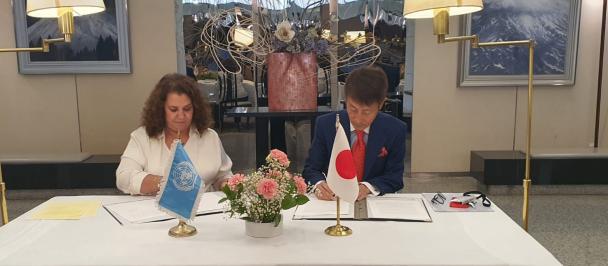Promoting Inclusive Access to Justice in Yemen (PIAJ)
| Coverage | Sana'a and Aden Governorates (pilot locations) followed by Hodeidah and potentially Hadramout |
| Target Groups | The poor, internally displaced persons (IDPs), women, juveniles and other marginalized populations such as Muhamasheen |
| Focus Area | Governance and Rule of Law |
| Partners | Office of the Special Envoy of the Secretary-General for Yemen and implementing UN agencies including UNFPA, UNICEF, UNHCR, UNODC, UN Women |
| Project Manager | GROL, Team Leader Dr. Lucy Mathieson |
Project Summary
Yemen has experienced protracted conflict since 2015 and is considered to be the worst humanitarian and development crisis in world. Public institutions including Rule of Law related institutions are dysfunctional, lacking infrastructure, equipment and human resource capacities. Lack of inclusiveness in decision making at all levels, spread of corruption, injustice, and insecurity collectively undermine the ability of the Yemeni population to live in safety and security and to have access to effective justice.
The project is framed by a structured ongoing consultative process and bottom-up approach for building-in local ownership, developing local priorities and proposed solutions. The project also supports a strategic approach to Rule of Law coordination and sharing of good practices, through the annual RoL workshop and Steering Group.
This Project Document (PRODOC) represents the cornerstone of UNDP’s second phase of RoL programming and contributes to a larger Draft RoL Programme Vision Strategy that the Embassy of Netherlands for Yemen has already sighted and fed into its design. As the initiation of a larger vision, this project document sets out the three main governorates (plus one additional governorate if required) to be included within this project over a three-year period.
Objectives
To strengthen the resilience of institutions and communities and, to maintain a foundation for recovery and reconstruction, the project focuses on the following areas:
- Community safety and security initiatives: Diverse community protection needs, including those of women and youth addressed.
- More accessible justice: Services for vulnerable populations, such as the poor, IDPs, women, juveniles and other marginalized populations such as Muhamasheen are provided.
- Gender justice capacity: Gender-inclusive rule of law institutions with stronger women’s participation and leadership in the delivery of security and inclusive justice services to women and girls is enhanced.
- Detainee protection: Improvements in basic conditions of detention, access to education and training, and reintegration of detainees into the community after release to protect from stigma and ostracism improved.
The strategy pursued by PIAJ rests on four main interlinked components (the four Project Outputs) in addition to UNDP Yemen’s Governance and Rule of Law Portfolio (GRoL) 2021 transition to a “triple nexus” programming approach from the previous crisis-humanitarian period. It is aimed at integrating improvement of resilience to shocks and the ongoing conflict, while beginning inclusive and sustainable development programming - upholding the interrelationship.
This project will integrate a broad approach whereby it will support women justice actors to become justice leaders. International experiences show that it is possible to promote women’s participation in decision-making from the start of the emergency.
Expected Results
- Output 1 - Community safety enhanced through inclusive processes
- Output 2 - Increased awareness of rights and use of fair and effective formal and informal justice systems
- Output 3 - Gender justice capacity strengthened through gender-inclusive institutions
- Output 4 - Protection of detainees strengthened and reintegration into community supported

 Locations
Locations



